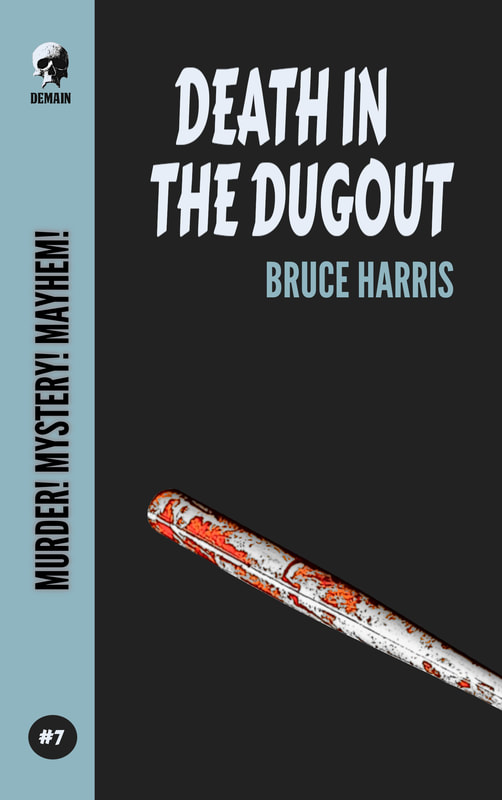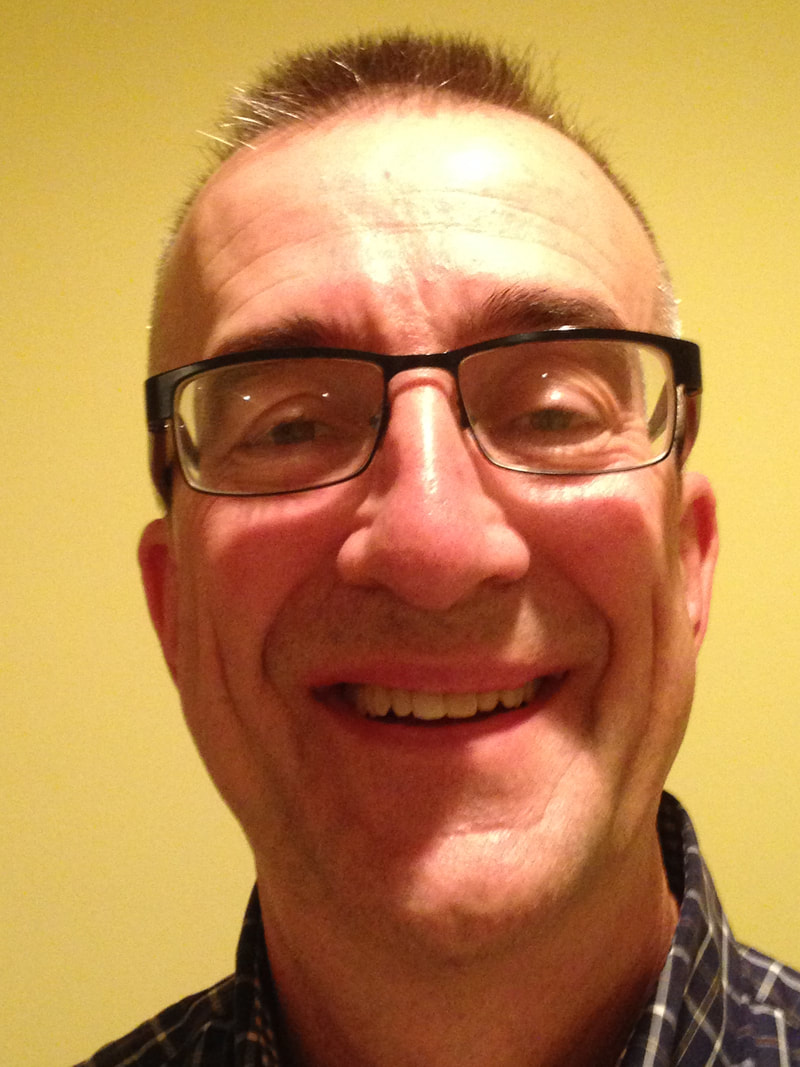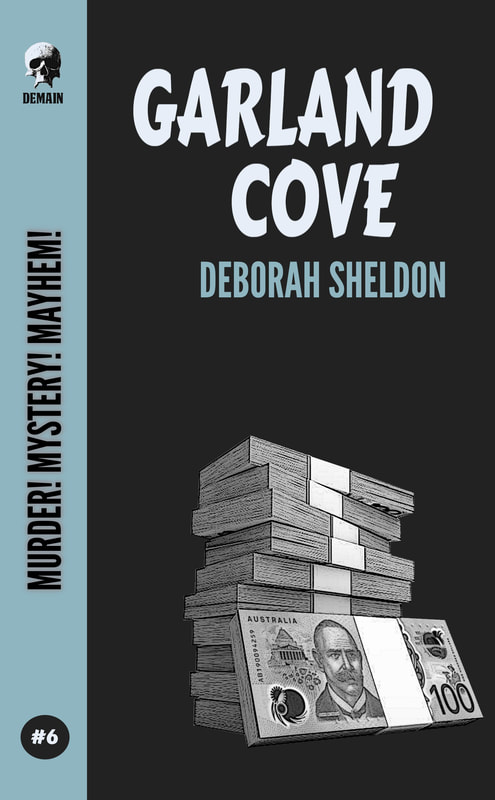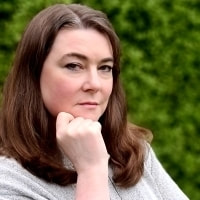|
|
|
American author Bruce Harris joins DEMAIN with his Murder! Mystery! Mayhem! ‘Death In The Dugout’ (book 7 in the series; cover by Adrian Baldwin). The book is released on 21st August but is currently available for pre-sales. Prior to publication Dean and Bruce sat down and chatted.
DEMAIN PUBLISHING: Welcome Bruce! Loved your M!M!M! – for those that don’t know you, can you tell us a little bit about yourself. BRUCE HARRIS: Hey! Happy to be here. I live in New Jersey in the United States. After a 30-year career at UPS, I retired in 2018. I’ve been a baseball fan all of my life and like many others, dreamed of becoming a professional baseball player. I played the game through high school, but my anaemic .220 batting average coupled with a weak throwing arm did not bode well for a major league career. Since 2014, I’ve been a member of the Society for American Baseball Research (SABR). My wife is a psychologist. She still works. We have two grown, adult children. DP: Nice. I spent some time in the States and whilst (US) football is my first love, I have soft spot for baseball…so what was your first introduction to the crime/thriller genre? BH: In addition to baseball, I have always been fascinated with Sherlock Holmes. I was never much of a reader as a child, but way back in 1965, I read the short story, The Adventure of the Speckled Band and was hooked on Holmes. I still have the paperback I read so many decades ago. Sherlock Holmes became (and still is) an obsession. I devoured all 60 of the Holmes stories and became interested in the minutiae. It has been a lifelong love affair. DP: That’s cool – as a kid I was really into Sherlock Holmes too but every now again I’ll grab a novel from the shelf and have a re-read. Great stuff. Your M!M!M! then… BH: I followed the old adage, “write what you know.” I know baseball. I thought it would be fun to write a baseball murder mystery, and it was! Nine players on a team, nine suspects! Of course, there are other characters, but basically nine people could have murdered the team manager. Each had opportunity and a motive. The murder takes place in the dugout before the start of a game. A beat newspaper writer and a coach team up to solve the mystery. I’m hoping readers find it a worthy whodunnit. DP: I’m sure they will. With your expertise in the subject I’m assuming this time around you didn’t have to do much research… BH: No, not in this case. I’ve researched for other writings, but there was no need for me to research anything for this book. DP: I’m also guessing you didn’t find it particularly difficult to write? BH: All writing is difficult. This was no exception. The story went through a number of versions before it was finished to my satisfaction. A professional editor helped me delete a lot of extraneous material and the final version is the better for it. DP: Cool, cool – what is Bruce Harris’ biggest success to date? BH: I’ve written and published two books about Sherlock Holmes: Sherlock Holmes and Doctor Watson: ABout Type (2006) and Anticipations in D. Martin Dakin’s ‘A Sherlock Holmes Commentary’ (2021). Both are research driven, “scholarly” works. I’m thrilled to be a part of Demain Publishing. DP: And we’re thrilled to have you! Tell us about the kind of books / authors you read… BH: There are many. In addition to Arthur Conan Doyle, there is Mickey Spillane, David Goodis, Cornell Woolrich, Raymond Chandler, Dashiell Hammett, and of course, Ellery Queen. I’m also a big fan of the old pulp crime/mystery magazines. DP: Some great names there for sure! What does crime / mystery (or thriller) mean to you? BH: In my opinion, there is a distinct difference between crime and mystery. I enjoy reading crime and noir fiction, but find it challenging to write. Mystery means “whodunnit.” I love a classic, locked-room whodunnit. One of the things I enjoy is thinking about what appears to be an impossible murder, and figuring out how to make it possible and believable. Thriller is its own genre. DP: Great answer. What do you think draws readers to the mystery genre? What do readers look for? BH: I think readers look for a fair mystery. Are enough clues planted so that the reader could solve the mystery along with the detective? I tried to make Death in the Dugout fair. I hope a careful reader could figure out who the murderer is. DP: Creatively Bruce is there anything you’d like to do that you haven’t done yet? BH: I’d like to write a full-fledged mystery novel, somewhere in the 60,000 – 80,000-word range. It takes a lot of planning and discipline. DP: My Lord it does doesn’t it? So writing is a long term career for you? BH: Writing is not a career. It’s a hobby. I enjoy the challenges, and try to write something each day. I don’t feel right if a day goes by and I didn’t write. DP: And I guess during the lockdown you were able to write every day! BH: I was fortunate. The lockdown didn’t impact me too much. I was retired, so work was not an issue. I find it stimulating to write in coffee shops, so that wasn’t possible. I belong to a local writing group. The lockdown forced us to meet via Zoom. It was an adjustment. I’m happy to say we have begun meeting in person again. The change involved my wife. She worked from home. I had to tune out her work-related conversations and phone calls and concentrate on my writing. DP: Finally Bruce, what is something your readers might be surprised to find out about you? BH: I have a Ph.D. in Social Psychology. Thank you Bruce for your time, all the best with Death In The Dugout. If you would like to connect with Bruce direct: https://www.facebook.com/bruce.harris.5015
2 Comments
Murder! Mystery! Mayhem! Book 6 is Garland Cove by Deborah Sheldon. Deborah and DEMAIN have previously worked together on a Short Sharp Shocks! (Hand To Mouth). The book is published on 21st August (but is currently available for pre-sales) with a cover by Adrian Baldwin. Prior to publication, Dean and Deborah had a good old natter.
DEMAIN PUBLISHING: Welcome back Deborah – it’s great to be working with you again. Okay, so for those that don’t (yet!) know you can you tell us a little about yourself and how (or why) you became a writer. DEBORAH SHELDON: Hi, it’s great to be back. I’m an award-winning author from Melbourne, Australia. I write short stories, novellas and novels across the darker spectrum of horror, crime and noir. My award-nominated titles include the novels Body Farm Z, Contrition and Devil Dragon; the novella Thylacines; and the collection Figments and Fragments: Dark Stories. My collection Perfect Little Stitches and Other Stories won the Australian Shadows ‘Best Collected Work’ Award, was shortlisted for an Aurealis Award and longlisted for a Bram Stoker. As editor of the 2019 edition of Midnight Echo, I won the Australian Shadows ‘Best Edited Work’ Award. My short fiction has appeared in many well-respected magazines such as Aurealis, Midnight Echo, Island, Pulp Modern, Andromeda Spaceways, and Dimension6. My fiction has been shortlisted for Australian Shadows Awards and Aurealis Awards, and included in various ‘best of’ anthologies. In 2020, Demain Publishing released my novelette Hand To Mouth. As a child, I loved superhero comics. I created my own comics for fun and pleasure. At first, I thought I wanted to be an illustrator until I realised that I enjoyed writing the stories much more than drawing the pictures. I’ve been a professional writer since 1986. Earlier credits include TV scripts, feature articles, and award-winning medical writing. DP: Very cool. With regards to the crime/thriller genre what was your first introduction… DS: Enid Blyton’s Five Find-Outers and Dog series. However, the real heartstopper was Raymond Chandler. In the early noughties I discovered Chandler’s masterful creation, Philip Marlowe, and gobbled up the novels and most of the short stories. (I’ve kept three stories in reserve to read on my deathbed. At the time, I jokingly swore that I didn’t want to live in a world that didn’t have any more Marlowe stories and, to my surprise, I’ve so far kept that promise. Those final three stories await.) As everyone knows, Chandler is a tremendously talented author who writes ‘low-brow’ characters in a ‘high-brow’ way. His use of slang, ear for dialogue and attention to the specifics of locale influenced me greatly. I’m probably misquoting him, but in one interview, he said that a good story only needed action and dialogue; anything more (such as internal monologues or authorial asides) revealed the writer to be a hack. While I don’t subscribe wholeheartedly to that philosophy, I certainly keep it in mind when I’m writing. DP: Brilliant. I’ve read a couple of the Marlowe stories and love Robert Altman’s film The Long Goodbye (1973) but think I need to add some more to my (ever growing) TBR pile. Tell us a bit more about Garland Cove. DS: The germ of Garland Cove came from a news story in an Australian newspaper: an armed robbery was thwarted when somebody noticed the assailant’s gun was a replica. I’d been wanting to write a story with a cast of shady characters who are secretly at odds with one another, and this news snippet was my catalyst. Shane Croft is the protagonist of Garland Cove. He’s a small-time crim forced into working for corrupt detectives. Meanwhile, the detectives realise they are under scrutiny, and tell Shane to arrange a bank robbery where the robber has a replica gun. The detectives will save the day, become national heroes, and therefore derail the corruption investigation. Naturally, since every player is lying, shenanigans ensue. DP: They definitely do! Did you have to do much research for Garland Cove? DS: I worked in television back in the 1990s. On the show Australia’s Most Wanted, I was researcher, scriptwriter and script editor of the crime re-enactments. This first-hand experience helped me to write Garland Cove with a degree of confidence. I researched the nitty-gritties as I went along and filled in the gaps. I only ever do enough preliminary research to get started. Trying to do all the research before writing the first draft is, to me, a form of procrastination. How much preliminary research do you need? Well, how long is a piece of string? It’s too easy to lose yourself for weeks, months or even years down a rabbit hole. That’s why I research as I go. DP: Nice! So I suspect then that you didn’t find Garland Cove particularly difficult to write? DS: No. Once I had worked out the temperaments, ambitions and needs of the characters, the story flowed with reasonable ease. It was first published in The One That Got Away (Dark Prints Press, 2012), and I’m grateful to Demain Publishing for giving it another chance. I loved writing Garland Cove so much that, in 2013, I expanded the novelette into a novel, which I titled Garland Cove Heist. While I received plenty of positive and encouraging feedback from Australian publishers, none were prepared to take the risk of signing the manuscript because I was not a ‘name’ author. Such is life. Garland Cove Heist is my ‘bottom drawer’ novel. But doesn’t every author have at least one to feel sad about? DP: At least one! And a couple of screenplays! Anyway, let’s not get too morose. What books/authors do you read and do you think they influence you as a writer? DS: I have eclectic tastes. Generally, I avoid bestseller lists. I like to wait until history decides if a novel is worthwhile. That’s why my bookshelves are filled mainly with novels from the early-nineteenth to late-twentieth centuries. However, short stories are a different matter. I read English-language anthologies all the time – mainly those published in Australia, New Zealand, USA, UK, Canada and South Africa – and I enjoy translated works too. My go-to genres are horror, crime, noir, classic and literary, but I read across a wide range. I don’t think you can aspire to be a good writer unless you’re well-read. To put it another way: if you only explore one genre, you’ll only be a one-dimensional writer. Everything I read influences me. Each story that I enjoy prompts me to try a different technique, approach or style. And each story I dislike reminds me of what not to do. DP: I’m with you – though I class myself as a ‘horror’ writer I actually don’t read many horror stories anymore (other than those I read for DEMAIN obviously) and my tastes are getting broader and broader…creatively is there anything you’d like to do that you haven’t yet? DS: I have a background in scriptwriting. The subject comprised part of my writing-oriented Bachelor of Arts. I was employed by Grundy Television for a few years, and worked with Crawfords Australia (another TV production company) on a couple of projects. I developed a documentary but not to the point of signing on that final and much-coveted dotted line. I have one script in particular I’d love to bring to the screen. However, Australia’s film and TV industry is woefully underfunded, and while ‘reality TV’ rules the roost, I doubt I could find a single producer willing to look at my work. That said, I console myself by remembering how the world keeps turning. What’s hot today will be cold tomorrow; what’s passé now will soon be in vogue. Perhaps the marketplace will be receptive if I just wait long enough. And if not…well, that’s life in the big city, right? No use crying about it. DP: Definitely not. You’re so right about the world keeping turning – The Queen’s Gambit (2020) was in development for over thirty years I believe! Is writing a long term or short term career for Deborah Sheldon? DS: Writing has been the through-line of my life. I’ve been a professional writer for 35 years. I sold my first piece when I was 18 years old – a non-fiction article about steroid abuse in bodybuilding that I wrote during my first semester of university, 1986. For a few years, I contributed feature articles to Australian and international magazines, then worked as a section editor for a small London newspaper when I lived there for a while. Back in Melbourne, I worked at the aforementioned Grundy Television, focused on medical writing (winning a couple of awards), released two non-fiction titles with Reed Books and Random House, and had an original screenplay optioned by Crawfords Australia, amongst many other projects. I made a good living as a writer back in the nineties and early noughties. I turned my focus towards fiction in late 2007 and just kept on going. DP: And finally Deborah, can you tell us something your readers might be surprised to find out about you? DS: While I write hardcore crime, noir and horror, I’m a private and sensitive person who is easily moved to tears. Writing fiction helps me exorcise my anxieties. Thank you so much for your time Deborah, it was great to speak to you again. Best of luck with your M!M!M! If you would like to connect with Deborah direct: Website: http://deborahsheldon.wordpress.com Goodreads https://www.goodreads.com/author/show/3312459.Deborah_Sheldon Amazon Author Page https://www.amazon.com/~/e/B0035MWQ98 |
CategoriesArchives
July 2024
AuthorDean M. Drinkel |




